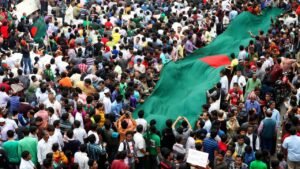Bangladesh Crisis 2024 after Quota Reform Movement in Bangladesh: A Deepening Political and Communal Conflict

Bangladesh, a nation often cited as a model of economic growth and development in South Asia, is currently in the throes of a severe crisis. The situation, which began with student-led protests against the government’s controversial quota system, has escalated into widespread violence, particularly targeting the Hindu minority community. This unrest has not only exacerbated the country’s internal divisions but also raised serious concerns on the international stage regarding the stability of the region and the safety of its minority populations.
Origins of the Bangladesh Crisis 2024 : The Quota System Controversy
The roots of the current unrest can be traced back to the government’s handling of the quota system in public sector jobs. For years, students and job seekers have expressed frustration with the quota system, which they argue unfairly advantages certain groups while marginalizing others. The system, designed to reserve government jobs for certain segments of society, has been criticized for being outdated and disproportionately benefiting the elite and politically connected.

When student protests against the quota system erupted, the government initially responded with promises to reform or abolish the quotas. Prime Minister Sheikh Hasina even announced that the quota system would be revoked. However, the protests did not subside. Instead, they escalated, reflecting a broader discontent within the population, particularly among the youth, who are grappling with high unemployment and economic uncertainty.
Escalation of Violence: Targeting the Hindu Minority
As the protests grew, they took on a more violent and communal character. Hindu homes, businesses, and temples have been increasingly targeted in what appears to be an orchestrated campaign of intimidation and violence in Bangladesh Crisis 2024. Reports of attacks on Hindu communities, including vandalism, looting, and arson, have become disturbingly common. The violence has not only caused physical destruction but has also instilled deep fear within the Hindu minority, a group that has long faced discrimination and violence in Bangladesh.

The case of Kajal Roy, a Hindu councilor from Rangpur who was among the approximately 100 people killed in the riots, highlights the severity of the situation. Roy’s death is a tragic example of the targeted nature of the violence and the vulnerability of Hindu community leaders who speak out against such attacks.
The rise of Jamaat-e-Islami, an Islamist political party with a history of opposing secular governance in Bangladesh, has further inflamed communal tensions. Jamaat-e-Islami’s involvement in the protests and the subsequent violence against Hindus suggests a broader agenda at play, one that seeks to exploit the current political instability for sectarian gains.
Political Instability and Regional Implications

The violence against Hindus in Bangladesh Crisis 2024 is occurring within a broader context of political instability. Bangladesh’s political landscape has been fraught with tension, particularly between the ruling Awami League, led by Prime Minister Sheikh Hasina, and the opposition Bangladesh Nationalist Party (BNP), headed by Khaleda Zia. The BNP, along with Jamaat-e-Islami, has been accused of using the unrest to destabilize the government and gain political advantage.
The situation is further complicated by allegations that opposition elements have ties to Pakistani intelligence agencies. These connections raise strategic concerns, particularly for India, which views the Awami League as a key ally in maintaining regional stability and countering extremist influences in South Asia.
The absence of an interim government during the recent elections, a break from tradition in Bangladesh’s electoral process, has also added to the instability. This deviation has led to questions about the legitimacy of the electoral process and has fueled the opposition’s claims of undemocratic practices under Sheikh Hasina’s leadership.
The International Response and Strategic Concerns
The ongoing Bangladesh Crisis 2024 has not gone unnoticed by the international community. Western countries, including the United States, have expressed concern over the violence and the political situation in Bangladesh. There is a growing sentiment among some international observers that Sheikh Hasina’s government, despite its economic successes, has increasingly become authoritarian, stifling dissent and undermining democratic institutions.
India faces strategic dilemmas in Bangladesh Crisis 2024 due to the potential ousting of Sheikh Hasina. The Awami League has been a reliable partner for India, particularly in terms of counter-terrorism cooperation and regional security. The rise of the BNP, especially if supported by Jamaat-e-Islami, could lead to a government less friendly to India and more aligned with Pakistan’s strategic interests.
For India, the violence against Hindus in Bangladesh Crisis 2024 is not just a humanitarian concern but also a strategic one. The targeting of Hindus, who have cultural and religious ties to India, could inflame communal tensions within India and put pressure on the Indian government to respond. This, in turn, could strain bilateral relations between the two countries and complicate India’s broader regional strategy.
Humanitarian Crisis: The Plight of the Hindu Minority
The violence against Hindus in Bangladesh Crisis 2024 is reminiscent of the atrocities committed during the country’s 1971 Liberation War, where large-scale violence against Hindus was a tragic hallmark. Today, as in 1971, the Hindu community in Bangladesh is facing a grave threat to its safety and survival.
The attacks have forced many Hindus to flee their homes and seek refuge in safer areas, often in makeshift camps or with relatives. The displacement of Hindus is creating a humanitarian crisis, with urgent needs for shelter, food, and medical care. The fear of further attacks has left many Hindus living in a state of constant anxiety, uncertain about their future in a country that has been their home for generations.
The Role of the Government and the Military

In response to the escalating violence and political unrest, the Bangladeshi government has taken several measures. The military is deployed to ensure law and order and political prisoners, such as BNP chairperson Khaleda Zia, are released. However, these actions have done little to quell the violence or address the underlying causes of the unrest.
The absence of the Awami League from recent high-level meetings with the President and other political parties underscores the deep political divide and the challenges of achieving national unity in the face of such a crisis. The government’s focus on security measures, rather than on dialogue and reconciliation, has raised concerns about its ability to restore stability and protect vulnerable communities in Bangladesh Crisis 2024.
Looking Ahead: Uncertainty and the Need for International Engagement
The future of Bangladesh remains uncertain as the country grapples with this multi-faceted Bangladesh Crisis 2024. The violence against Hindus is not just a symptom of the current political turmoil but also a reflection of deeper societal issues, including religious intolerance and communal tensions that have long simmered beneath the surface.
For the international community, the crisis in Bangladesh presents a complex challenge. On one hand, there is a need to support democratic governance and human rights, including the protection of minority communities. On the other hand, there is a strategic imperative to maintain stability in a region that is critical to global security interests.
Conclusion: A Call for Action
Bangladesh Crisis 2024 is a stark reminder of the fragility of peace and stability in the region. The targeted violence against Hindus, coupled with the broader political unrest, poses a serious threat not only to Bangladesh’s future but also to regional stability. The international community, including key stakeholders like India, must engage proactively with Bangladesh to address the crisis. This includes providing humanitarian aid to affected communities, supporting efforts to restore democratic processes, and ensuring that those responsible for the violence are held accountable.
As Bangladesh navigates this difficult period, the world must remain vigilant and committed to supporting a peaceful resolution that respects the rights and dignity of all its citizens. The stakes are high, not just for Bangladesh, but for the broader region, and the time for action is now.